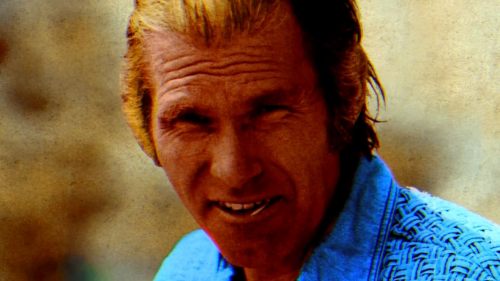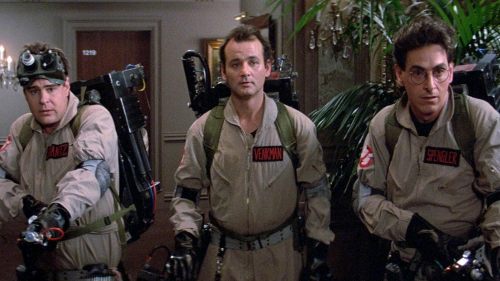Collins’ Crypt: AMERICAN GODS Season Two Was…Pretty Good?
I read Neil Gaiman's American Gods probably fifteen years ago, so my memories of it are dim at best. Some were refreshed by the ongoing comic adaptation from Dark Horse, but mostly it just reminded me of my general impression of the source material: it had so many different tangents and side stories that it was hard to judge as a whole. At times, I was riveted by the tale, other times bored, and there were plenty of moments in both examples where I had no idea what was going on. So on that very specific level, I have found the Starz TV show to be incredibly faithful to my overall opinion of the source: more than just a bit uneven, but one I want to stick with all the same.
For the fully uninitiated, American Gods (any version, no spoilers or medium specifics here) tells the story of Shadow Moon, who is paroled from jail a few days early on account of the recent accidental death of his wife. On his way home to attend her funeral, he makes the acquaintance of Mr. Wednesday, an enigmatic man who offers Shadow a job as his bodyguard/driver/etc. Shadow declines at first, but upon realizing he's got nothing else in the pipeline, reconsiders and takes the job after all. The two men set about on a mysterious road trip where Shadow discovers Wednesday and most of the other people they meet along the way are gods, and a war between the old gods (those of darkness, wisdom, knowledge, etc.) and the new ones (gods of pop culture, technology, etc) is brewing, with Shadow now caught in the middle for reasons not yet clear to him.
Despite receiving the first season on Blu-ray (I'm not a Starz subscriber) two years ago, I actually just watched it for the first time before diving right into the second season's set, which hits stores today. The show's troubled production history meant a lengthy delay between the two seasons (the second season finale aired almost two years to the day from the first season's premiere - and they are only eight episodes each), which probably didn't help its reception much, dipping from a 77 to a 45 Metacritic rating. Nor did the aforementioned behind the scenes woes, namely the departure of Bryan Fuller, a rightfully beloved writer (most recently of Hannibal fame) who was the first season's showrunner/head writer but departed at some point during the writing process for season two.

I'm not sure how much of his work (or that of Michael Green, who developed the show with Fuller and left at the same time) remains, because the thing about the show that I know for sure with regards to the book is that it's not particularly beholden to its narrative. I read somewhere that the show uses Gaiman's novel "for inspiration, not instruction", and I find that to be a perfect description. The characters are more or less the way I remember them (Ricky Whittle's Shadow Moon is quiet, Ian McShane's Mr. Wednesday is charming but suspicious, etc.), but what they do and when they do it (and who they do it with) often have me wondering "wait, did they skip over that thing?" only to realize that no, they were actually skipping AHEAD to something. And then back. And then forward again. And... well, you get it. The "mix and match" approach is not unlike what Fuller did with Thomas Harris' books for the Hannibal show, but apparently Gaiman wasn't too thrilled about it and wanted the show to be more faithful going forward.
But the ironic thing is that some of the show's first season inventions provided some of its better moments, and those have continued (and even gotten stronger) in season two. For example, in both the book and TV show Shadow's wife Laura is killed in a car accident, only to be inadvertently revived when the man tosses a lucky coin he got from a tall leprechaun named Mad Sweeney onto her grave. But it turns out it was Sweeney's lucky coin, and is basically cursed without it, so he tracks down Shadow to demand it back. In the book, Shadow tells him where it is, and Sweeney more or less gives up hope, knowing he'll be dead before he can retrieve it (he is correct). But here in the show, Sweeney goes to Laura's grave to get it, realizes that she's been resurrected from its power, tracks her down, and demands it back, only for her to realize he can't just take it from her (it has to be given on her own free will). Knowing he can be of some use, she demands he help her first, THEN she'll give him his coin back.
So just as Shadow and Wednesday are on their road trip together, so are Sweeney and Laura, as Sweeney needs to stay by her to ensure he gets his coin back (and benefit to some extent from its lucky power, as the further he gets from it the more susceptible he is to injury and disaster) and she needs help in getting back to Shadow while also hopefully finding someone who can help her increasingly zombie-like appearance. Not only is this one of the show's more interesting subplots, it's also one of the most prominent, and it continues into season two - all for two characters who never even meet in the book. Watching Laura and Sweeney's hate/love relationship develop over that dozen or so episodes was probably my favorite thing about it, and if the season two finale is any indication, it will continue in some form (I won't include spoilers for those who have also had to wait until the physical release).

Of course, Sweeney and Laura's antics aren't the only difference. Because of the way they changed up the order of things (such as Easter's grand introduction; a season 1 finale event that didn't happen until a point of the book they otherwise still haven't reached), there's no easy way to determine how much is left; even if they decided to stick precisely to the book from now on (except for the things they already did, naturally) they could probably get another two seasons from the book's major events and locales. Shadow's time in Lakeside, for example, could take up an entire season and he hasn't even gotten there yet (Gaiman promises he'll get there in season three). Plus, as they've expanded some of the book's other characters, such as Mr. Ibis, into major players, there's plenty of opportunities to keep expanding as well as develop relationships between characters who, like Laura and Sweeney, had no connection at all in the novel.
And to me, that's really what set season 2 apart from 1: it continued to carve its own path and turn these minor characters into major players that could easily take focus for an entire episode down the road (indeed, they did just that for Mad Sweeney, in "Treasure of the Sun", one of the series' best hours). Crispin Glover's villainous Mr. World only appeared in two scenes throughout the first season (despite getting a starring credit on every episode; excellent work from Mr. Glover's agent) but appeared throughout several episodes here, and I assume will get his own World-centric episode soon as we discover his character's true nature. It still offered up the graphic sex and startling moments of violence that helped set the show apart from its cable brethren, and - again - was still a bit overstuffed at times resulting in some "OK just what the hell is going on right now?" kind of feelings, but overall I don't see that the show's behind the scenes shakeups have made any drastic changes to its on-screen content*. It's just coming into its own, same as it presumably would have if the exact same team was behind it. And they're still not exactly sticking to the book, so even Gaiman seems to realize that there are opportunities to mix things up that he shouldn't avoid just because he didn't think of it the first time.
Long story short, if you wrote off season 2 because of Fuller's departure or the subsequent bad reviews, I am here to suggest that you give it a chance if you enjoyed its first season. Watching them back to back I was expecting whiplash, but instead I felt that it was still the same show, for better or worse (they still don't seem to have any clear set of rules for when the show changes aspect ratio; at first they only used widescreen for "Somewhere in America" flashbacks but now they use it for present-day scenes too). Despite its imperfections (and, as with all sophomore runs, some of the novelty wearing off) what I saw in S2 was a clear sign of a show that wasn't rushing to end anytime soon, and taking its time to expand its supporting players. Sometimes (especially in the premiere, which certainly didn't help) this made it feel a bit too scattershot, but in the long run it paid off - I mean, how can you argue against giving a LOT more screentime to Yetide Badaki as Bilquis, whose introduction in season one is possibly one of the most f-ed up things you'll ever see on a cable television show? Maybe they haven't worked out all of the kinks yet, but neither did Gaiman with his novel as far as I'm concerned, so I'm sticking around for S3.
*Gillian Anderson left along with Fuller, presumably out of loyalty to Fuller, but they worked around it by having the character reform herself into "New" Media, portrayed by Kahyun Kim. Call it the Parnassus Maneuver. As for Kristen Chenoweth (another Fuller alum), her character was written out via dialogue but could possibly return. However as she only appeared in one episode in the first season I wouldn't say it caused any massive difference - and besides, no TV show in history has played out without cast availability forcing some quick "off they go" dialogue that we just have to accept.



